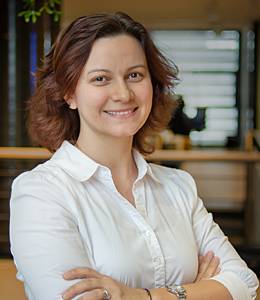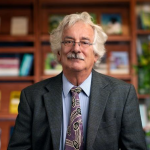0.2.1 Meet the course team
Course subject(s)
0. Welcome to Water Works!
Module 0. Getting started with Structured Expert Judgement (SEJ)

Tina Nane is an Assistant Professor of Applied Probability at Delft University of Technology since 2015. She is the responsible lecturer for BSc and MSc courses in decision theory and structured expert judgement and has conducted training workshops for structured expert judgment methods.
Her current research primarily focuses on uncertainty quantification and analysis, both data-driven and by employing expert opinions, both from an applied, as well as from a theoretical perspective. The structured expert judgment applications span over a variety of areas, including source attribution of food and waterborne illnesses in U.S., dike failure assessments in The Netherlands or citation analysis.
Tina has a PhD in Statistics and a cum laude MSc in Risk and Environmental Modelling from Deft University of Technology. Her MSc project focused on the risk assessment of merging and spacing airborne protocols. This work was the result of a close collaboration with NASA Langley Research Centre. The project was not only Tina’s first encounter with a concrete application of uncertainty quantification and the use of structured expert judgment, but also an opportunity to hold and organize uncertainty quantification training workshops for NASA. This triggered an ongoing academic interest and a strong passion for knowledge dissemination.

Anca Hanea is a senior researcher based at the Centre of Excellence for Biosecurity Risk Analysis (CEBRA) at the University of Melbourne. Anca Hanea is an applied mathematician, who has worked in universities and research institutes for 10 years (after defending her PhD) in the area of probabilistic modelling. Roughly half of her time is dedicated to teaching and student supervision and the other half to research.
The uncertainty quantification process (using data or structured expert judgement) is an integral part of (probabilistic) modelling. Anca’s urge to perform this task rigorously comes from her passion for modelling and her training as a mathematician. Anca started her career as a probabilistic modeller during her PhD research where she developed a new approach for a particular type of dependence modelling, namely probabilistic graphical modelling, and even more specifically Non Parametric Bayesian Networks (NPBNs).
Anca was instrumental in building a COST European network for Structured Expert Judgment (SEJ) elicitation and aggregation, and related standards for the European Food Safety Authority (EFSA). Together with colleagues from University of Melbourne, she has developed, tested and co-authored guidelines for the IDEA protocol for SEJ. She has taken part and facilitated numerous expert elicitations in various projects undertaken by WHO, EFSA, and European Framework 7 Programme, DARPA, Cawthron Institute and many universities around the world.
Research interest;
- uncertainty quantification
- structured expert judgment
- dependence modelling

Roger Cooke is the Chauncey Starr Senior Fellow at Resources for Future in Washington and an emeritus professor at TU Delft. Her received his bachelors degree (1968, Phi Beta Kappa, magna cum laude) and PhD (1975) from Yale University in mathematics and philosophy. From 1975-2005 he worked in the Netherlands as assistant professor in logic and philosophy of science at the University of Amsterdam, later as professor of Applied Decision Theory in the Department of Mathematics at the Delft University of Technology. In 2005 he moved back to the USA as senior fellow at Resources for the Future. In 2006-8 he supervised the development of non-parametric continuous-discrete Bayesian Belief Nets for the Dutch Ministry of Transport. Subsequent development was under contract with Shell, AIRBUS and the National Institute for Aerospace. In 2008 he was elected fellow of the Society for Risk Analysis.
Roger Cooke is the patron and greatest endorser of the Classical Model, which is frequently referred to as the Cooke’s method for structured expert judgment. His book, “Experts in Uncertainty”(1991) marks the formal birth certificate of the Classical Model.
His short course on Expert Judgment has been given several times at NASA Langley and NASA Headquarters. In 2010 he was named lead author in the 5th assessment of the Intergovernmental Panel on Climate Change for the chapter on Risk and Uncertainty. In 2011 he received the Lifetime Distinguished Achievement Award from the Society for Risk Analysis. He currently works on uncertainty quantification in conceptual design for AIRBUS and on value of information of Earth Observation Missions for NASA Langley. He consults for expert judgment studies on invasive species (NOAA), food borne diseases (WHO) and efficacy of public health measures (Robert Wood Johnson, CDDEP) and nitrogen loading in the Chesapeake bay (EPA).
Research interest;
- structured expert judgment
- dependence modelling

Decision Making Under Uncertainty: Introduction to Structured Expert Judgment by TU Delft OpenCourseWare is licensed under a Creative Commons Attribution-NonCommercial-ShareAlike 4.0 International License.
Based on a work at https://online-learning.tudelft.nl/courses/decision-making-under-uncertainty-introduction-to-structured-expert-judgment//.



